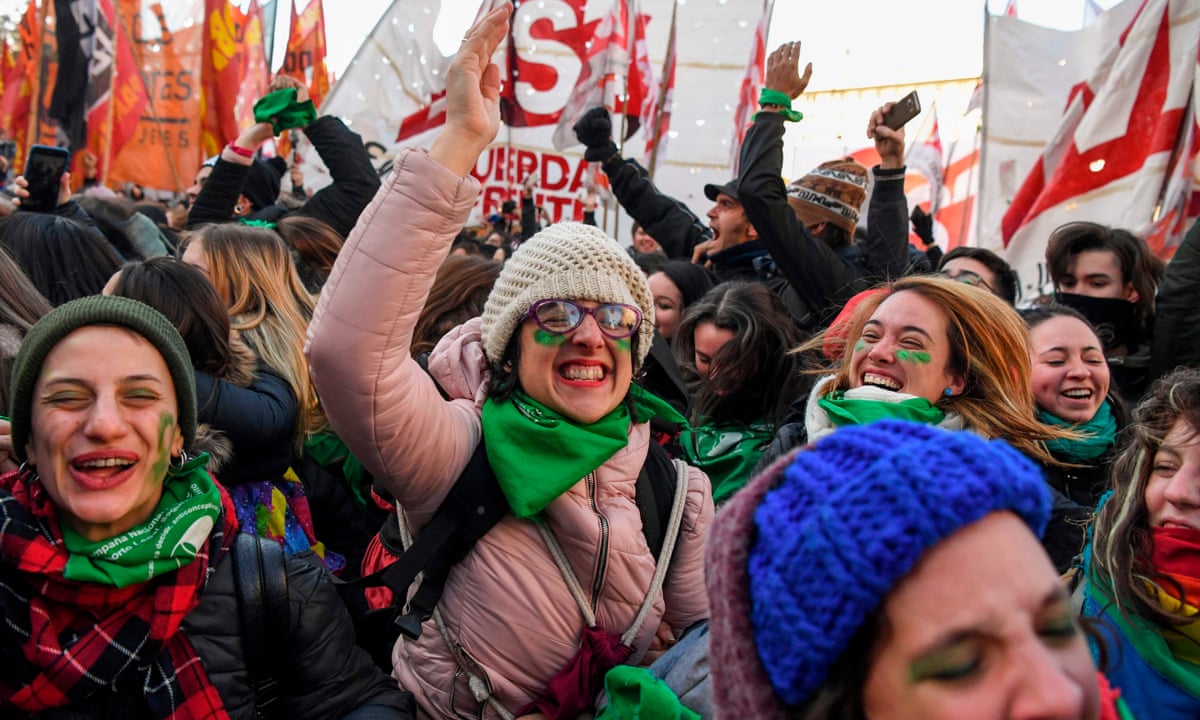
Argentina Takes a Step Towards Legalizing Abortion
After decades of struggle, Argentina’s green bandana movement — the mass movement that took the streets by storm has won a step towards legalizing abortion.
Early on Friday morning, the House of Representatives passed the measure: 131 in favor and 117 against, with six abstentions. Sometime in the next few weeks, the bill, which is supported by President Alberto Fernandez, will go to the Senate for a vote. It seems likely to pass.
Last night’s scene was a familiar scene, reminiscent of the mass movement in 2018. Wearing masks as well as the green bandanas that symbolize the right to an abortion, thousands of people came out in expectation. Thousands stood in the plaza in front of the Argentine Congress, wearing green bandanas. The 2018 movement made the green bandanas a commonly worn symbol in Argentina, hanging from backpacks to show support for the right to an abortion — even when the bill was not being considered in Congress.
Last night, there were fiery speeches by experienced activists — those who have been pushing this for 15 years, as well as by young women recently awakened to political life. Thousands of banners read “make it law.” People held home-made green signs. A little girl, no more than 8 years old, held a glitter sign reading “my mother taught me to fight” and an older woman held a sign with the words “this time.” Political parties gathered with drums, chanting about the right to an abortion, against femicide, and austerity.
This morning, several thousand activists were still in the plaza. They had spent the entire night watching the debate on large screens and wanted to show that the movement is alive and well — and that they and the entire feminist movement are watching and continuing the fight. When the vote finally took place early on Friday morning, protesters tearfully hugged and cheered. A key step to legalize abortion had been taken.
Abortion at present is punishable by prison time for homicide, except in cases of rape or when the life of the person carrying the fetus is at risk. Such was the case with Belen (not her real name), who suffered a miscarriage and once at the hospital was reported to the authorities and sentenced to eight years in prison. She was released as the result of a mass movement calling attention to her case.
Indeed, Argentine feminists, part of one of the world’s strongest feminist movement, have been the ones to force the government’s hand on the right to an abortion. First and foremost have been the massive mobilizations, numbering up to 1 million in the streets of Argentina in 2018.
Then, the movement achieved approval of the right to an abortion by the House of Representatives, for the first time. But that time, despite the mass mobilization, it did not pass the Senate, where 38 senators ignored the hundreds of thousands of protesters demanding their rights. This time around, President Fernandez has promised that the Senate will pass the bill.
This vote also built on the feminist movement over the past few years, including the massive #NiUnaMenos (not one less) mobilizations against femicide in 2015, as well as the massive March 8 International Women’s Day mobilizations.
The existence of anti-abortion laws has not kept people from having abortions; it just means that they find ways to have abortions that are unsafe, resulting in more than 300 deaths a year in Argentina. Nearly 40,000 women were admitted to public hospitals for complications arising from illegal abortions in 2016 alone, according to a new report. Of these, 6,400 were of girls and teenagers ages 10 to 19.
The absence of abortion rights has also meant forcing some people to have children when they don’t want to: 7,000 girls ages 10 to 14 delivered babies in 2016-2018, frequently the result of rape, according to a recent report by Argentina’s Access to Safe Abortion Network.

